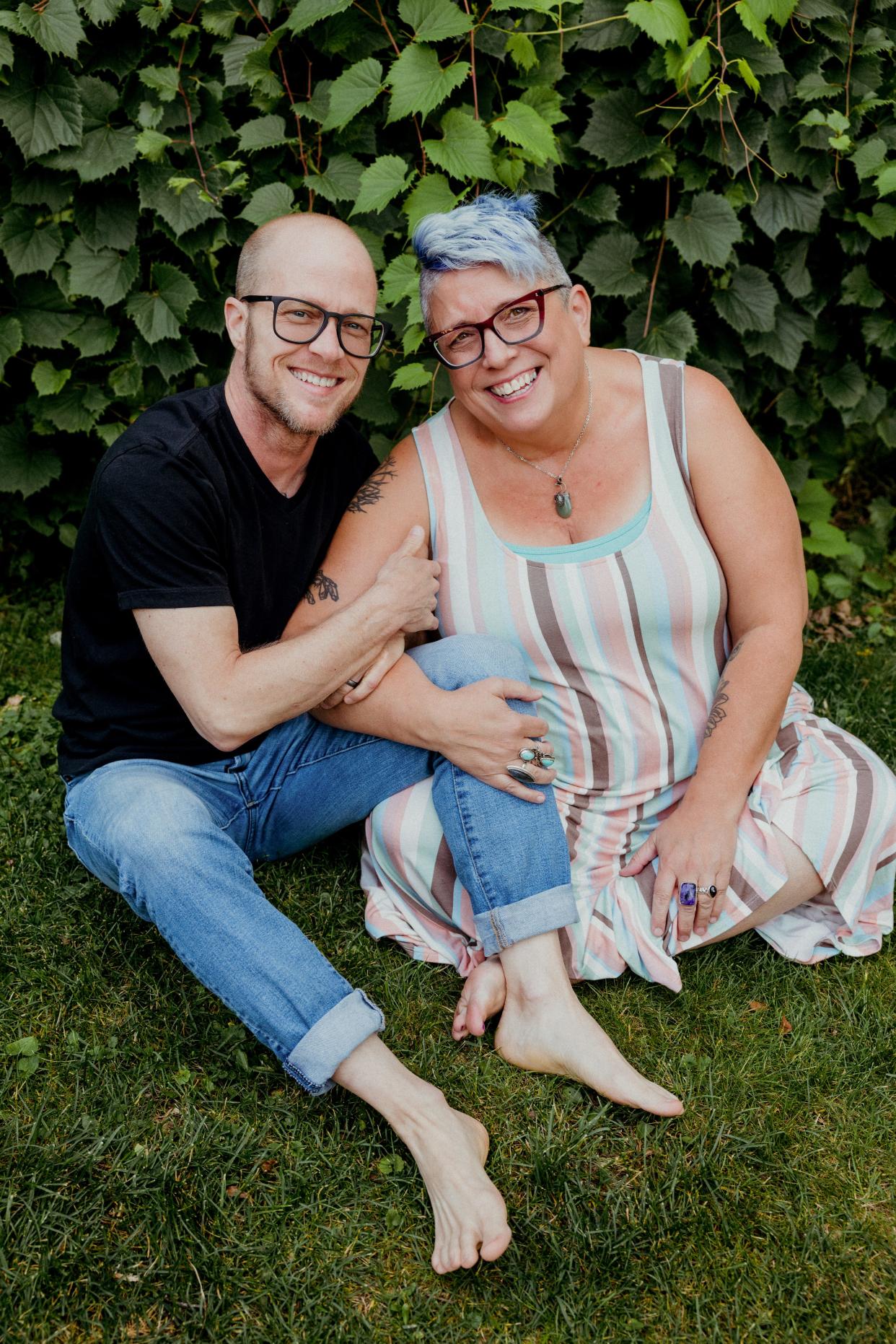If you think gratitude and thankfulness make you feel better, you're right. And science backs it up.

Zephyr Kendzierski never thought much about gratitude until they entered recovery for substance use disorder in 2006.
Neither did their wife Kathy Flores, until she survived a brain aneurysm in 2007.
Gratitude can come to us at unexpected moments, especially following chaos, the way a storm sometimes breaks for a spectacular sunset. It can serve as a reminder that the world is still capable of offering something at once powerful and grounding, despite wreckage. Gratitude can strengthen and fortify us every day, but so often, it assumes itself as the act of taking stock after loss.
For Kendzierski, gratitude meant disrupting a destructive pattern of seeing themselves negatively by practicing daily expressions of gratitude as part of their recovery. For Flores, it meant finding life meaningful and whole again after hospitalization, something as simple and keen as listening to her dog snoring next to her.
"So many people in recovery like myself struggle with mental illness, whether it’s depression, anxiety or other things," Kendzierski said. "Creating a new pattern, a new habit, has helped me to look for something positive rather than reinforcing that negativity bias so many of us are so prone to."
Life for Kendzierski and Flores bloomed as a couple following these tumultuous years. Prior to marriage equality becoming the law of the land in 2015, same-sex couples across Wisconsin enjoyed a brief window where they could be married. But the Appleton-based couple got married in 2014 in Chicago after the Outagamie County clerk denied marriage licenses to same-sex couples. Flores organized protests against the clerk, which energized her, while also taking its toll.
The stress of fighting discrimination, while simultaneously experiencing parents' deaths, health struggles and family issues dumped the couple into a rough patch early on in their marriage.
Flores, an LGBTQ+ activist who retired last April as the anti-violence program director at Diverse & Resilient in Appleton, proposed they start a gratitude ritual as a couple. For 30 days, the couple set a daily alarm to exchange expressions of gratitude, whether that meant appreciating the other for how they show up for their grandkids or their passion for social justice — or even something as simple as doing dishes.
It invigorated them so much they've never missed a day since. The ritual has transformed not only their relationships but their health, their perspectives and their priorities.
By strengthening gratitude, we become better decision-makers

Gratitude goes far beyond giving thanks once a year before a cornucopia of Thanksgiving splendors and family. Expressed with intention, gratitude has a profound effect on the brain, one that plays a critical role in how we understand and take care of ourselves and others, from loved ones to strangers.
When neuroscientists talk about gratitude, they often cluster it with other social and moral emotions like appreciation and compassion. That's no coincidence. These emotions activate similar networks in our brains, said Cortland Dahl, a scientist at the Center for Healthy Minds, part of the University of Wisconsin–Madison.
Gratitude works as a subset of appreciation, which is, in simple terms, orienting oneself to the positive, Dahl said. It could be noticing something in yourself or a "conscious noticing that tends to favor the positive," he said. Appreciation, under those terms, lays the groundwork for how we understand gratitude.
"Gratitude, I would say, is a very specific version of (appreciation), where we're oriented to something we really appreciate that has benefited us personally — somebody else's presence in our lives, how they've supported us, being the most common expression of that," Dahl said.
It's also not a coincidence that cultivating these emotions can improve our executive functions, the area from which we make decisions and problem-solve.
Just as we can strengthen our ability to problem-solve by engaging in puzzles and working through real-life conflict, we can intentionally grow our sense of care and compassion by way of mindfulness practices, such as meditation or keeping a gratitude journal. It turns out, Dahl said, conscious expressions of gratitude also strengthen our executive network.
"You have that win-win. You strengthen more positive social emotions, which obviously helps relationships and just how you feel about them. And it also strengthens your ability to be in the driver's seat of your own mind and emotions," Dahl said.
Caring is a muscle that can be worked
Exercising daily positive thinking works well for Flores and Kendzierski, even on the days they disagree or get into fights. Just beyond any quarrel is that warm slip of sunlight.
"When we're arguing and we think, 'How are we going to get through this?' gratitude is a reminder, a way to ground us," Flores said. "Just because you're pissed off or hurt, there's still so much good in the other person, and in each other."
Expressions of care, in addition to helping us work through negative moments, are also highly pleasurable. Offering sincere gestures of gratitude activates similar brain networks to those that fire up when we savor a piece of chocolate or tip back a frosty lager, Dahl said.
The "care network" of the brain, where we have compassion, gratitude and appreciation, overlaps with a set of regions often referred to as the rewards network, Dahl said. Located in the front center of the brain, and deeper still in what's called the ventral striatum and the nucleus accumbens, the rewards and the care network both make us feel, neurologically speaking, really, really good.
And like the craving of more chocolate that always comes with breaking off a single rich chocolate square, we do tend to grow our kindness and compassion the more we engage in positive social emotions.
Dr. Helen Weng, an alumna of the Center of Healthy Minds where she received her doctorate in clinical psychology, put this theory of compassion growth to the test by having a set of participants take part in an activity not for the faint of heart: They were tasked every day for two weeks with meditating over their loved ones, themselves, strangers they encountered and the most difficult people in their lives, in that order.
Beyond the discomforts of thinking intentional thoughts about people they otherwise tried not to think about — bosses, exes, bad neighbors — the participants exercised a compassion muscle, said Weng, now a research associate at the University of California San Francisco's Osher Center for Integrative Health.
This was put to the test when that group and a control group were shown images of suffering. Those who had been exercising compassion reacted in a more attentive and caring way to people suffering.
For those interested in the pure science of what is going on, our brains light up differently once we engage in caring for others regularly. The altruistic participants who practiced compassion in Weng's study had increased activation of the inferior parietal cortex, responsible for empathy and understanding; dorsolateral prefrontal cortex, responsible for emotional control; and the nucleus accumbens, one of the regions involved in rewarding emotions.
Weng and her research team also used games involving financial choices to see if practicing compassion resulted in more generous behavior in the world. When given the opportunity in an economic decision-making game, members of the group exercising compassion were more likely to spend their own funds to help a stranger who received an unfair amount of money from another player. These players gave strangers anywhere from $1 to $10 of their paychecks to even out the playing field.
The more we focus on caring for others, the more we notice when others are going through something difficult and are all the more likely to pitch in and help them, Weng concluded.
Caring for others is also in our best interest.
"The human brain has evolved to interact with and understand other people in order to help ourselves and the whole group to survive," Weng said. "And so it's deeply wired in us to connect to other people."
If you've ever experienced a warming sensation in your chest when you've felt compassion for another being, there's more than just poetry at play. The brain activates the insula, which gathers information from the internal body as it also connects to the rewards network. Sometimes, this activation truly has a warming effect.
Suffering isn't a requirement of positive thinking
Although Dahl works at a center that researches positive psychology, he realized he was not immune to negative feedback loops in his personal life. At the end of each busy day, he noticed the way he and his wife's chatter picked up once they started complaining about their lives.
Complaining, it needn't be said, is very easy to do, far easier than taking stock of all the good in one's life. The conversations, often ruminating on what someone at work said or how they should have responded to a situation, left them feeling exhausted and tense minutes before they were supposed to sleep.
Just as Kendzierski and Flores understood positive change was needed, Dahl and his wife tried to change the conversation. Instead of stress loading, they engaged in gratitude and appreciation practice before going to sleep.
When his wife was down on herself, Dahl asked her to name three things she's really good at. These questions are aimed at noticing the positives.
"It works like a charm every time," Dahl said. "We're happy and uplifted and go to sleep relaxed and not ruminating about the devastating thing we could have said to that coworker."
It's easy to become used to a current situation in life, Weng said, and to continue to want more while paying less attention to what's already going well in our lives. It's in our wiring, for the most part, to be driven to continue improving our lives. And while that's natural and good, it becomes a problem when we feel constantly dissatisfied and when the gifts already in our lives aren't enough.
"When we want everything to be better — better tasting, more abundant, more more more — it's really hard to be grateful," Weng said.
As Joni Mitchell reminds us, we don't know what we have until it's gone. Gratitude works the same way. We learn to be grateful for our health when we survive a medical emergency. Or we understand that we need to take care of ourselves when we've hit rock bottom.
"Gratitude is usually sharpened or strengthened when we struggle. That's the positive benefit of struggle, because it gives you that perspective of when things were going less well so we can appreciate when they go better," Weng said.
Thankfully, suffering isn't a requirement of positive thinking. For Dahl, it's about deactivating the default mode by training two other networks: the executive network — reasoning, decision-making, problem-solving — and the salience network, which is like the moderator who checks in and pays attention to the larger systems at play.
Part of what makes our default mode and all its mindless chatter so complex is that the default mode can also activate when we're thinking positive thoughts and recalling pleasant memories.
But by noticing when you're very angry or you're very calm, you can activate the salience network, Dahl said, and potentially deactivate the mindless chatter that tends to egg on negative self-talk.
Expressions of gratitude heal and teach others

In one text exchange from August, Flores texted Kendzierski, "Good mornin'. How are you, my love? Today I am grateful again/always at how you help out the girls so much. You are a sweet, loving, generous partner, stepparent, grandparent, human."
In response, Kendzierski texted Flores, "Today I'm grateful for all the opportunities you've given me to parent and grandparent. Love you, wife."
Gratitude, Kendzierski said, serves an important reset, and one that is especially vital as they navigate the world as a trans person.
"We hear such negative things every day from the outside world," Kendzierski said. "Even if it's just one positive thing in a day that somebody appreciates about me, that's good for my mental health."
They've invited all their grandchildren to take part in expressions of gratitude when they're visiting. But their 9-year-old granddaughter Ellie has taken a particular shining to the routine exchanges and is always eager to participate. She's always ecstatic to tell them how grateful she is to be with them.
"It's really cute. We try to model it for them, because we want to also show them loving relationships and what that looks like," Flores said. "Sometimes Zephyr will just say I'm really grateful for your grandma because of this specific thing. And that's how we share it in that moment."
Natalie Eilbert covers mental health issues for USA TODAY NETWORK-Wisconsin. She welcomes story tips and feedback. You can reach her at neilbert@gannett.com or view her Twitter profile at @natalie_eilbert. If you or someone you know is dealing with suicidal thoughts, call the National Suicide Prevention Lifeline at 988 or text "Hopeline" to the National Crisis Text Line at 741-741.
This article originally appeared on Green Bay Press-Gazette: Science behind gratitude shows it improves relationships

